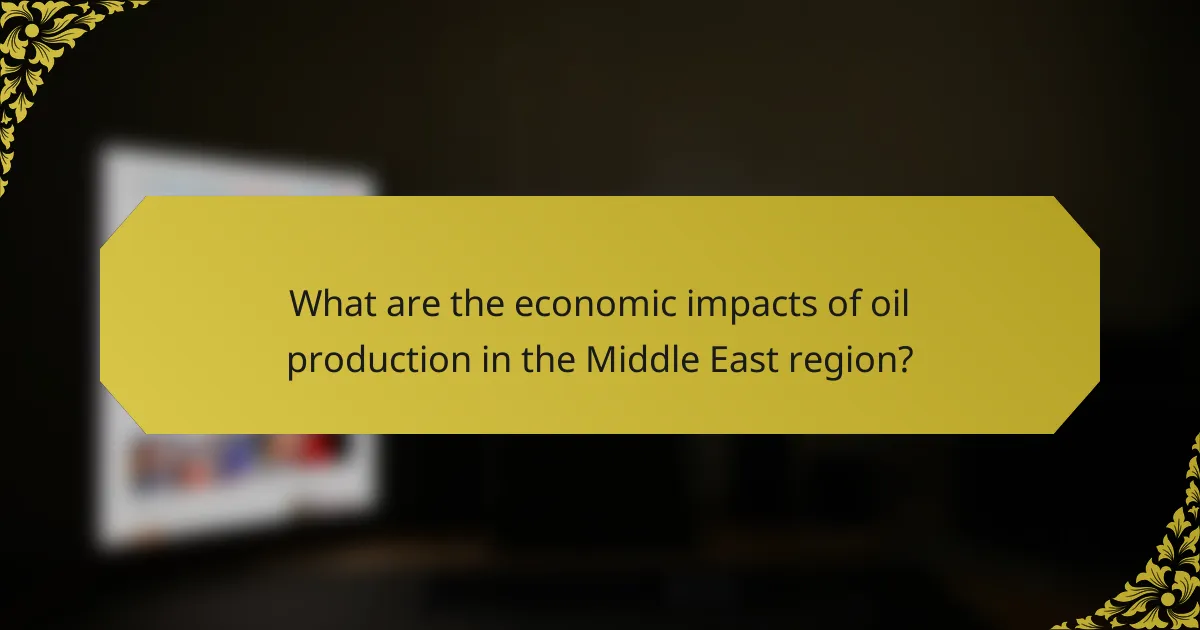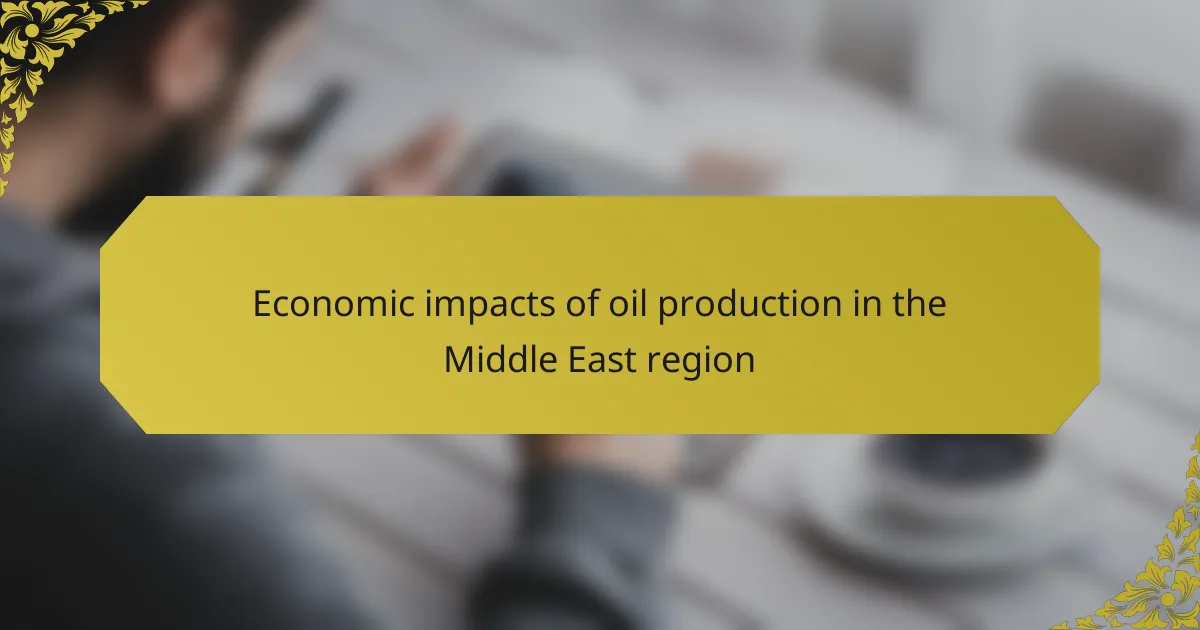
What are the economic impacts of oil production in the Middle East region?
Oil production significantly influences the economic landscape of the Middle East region. It generates substantial revenue for countries like Saudi Arabia, Iraq, and the UAE. This revenue supports national budgets and public services. Oil exports contribute to a large portion of GDP in these nations. For instance, Saudi Arabia’s oil sector accounts for about 90% of its export earnings. Employment in the oil industry also drives job creation and economic diversification. Furthermore, oil production attracts foreign investment, fostering infrastructure development. The volatility of oil prices, however, can lead to economic instability. For example, fluctuations in global oil prices directly impact government budgets and economic growth rates.
How does oil production influence the GDP of Middle Eastern countries?
Oil production significantly influences the GDP of Middle Eastern countries. These nations often rely heavily on oil exports for economic growth. For example, Saudi Arabia’s GDP is largely driven by oil revenues, contributing about 90% of its total income. This dependency creates a direct link between oil prices and national economic performance. When oil prices rise, GDP tends to increase, leading to higher public spending and investment. Conversely, a drop in oil prices can severely impact economic stability and growth. Countries like Iraq and Kuwait experience similar trends, where fluctuations in oil production and prices directly correlate with GDP changes. In summary, oil production is a critical factor in shaping the economic landscape of Middle Eastern countries.
What role does oil revenue play in national budgets?
Oil revenue is a critical component of national budgets in many Middle Eastern countries. It significantly contributes to government income, often accounting for a substantial percentage of total revenue. For instance, in Saudi Arabia, oil revenue represented approximately 90% of government income in recent years. This reliance on oil revenue allows governments to fund public services, infrastructure projects, and social programs.
Additionally, fluctuations in oil prices can impact national budgets dramatically. When oil prices rise, revenues increase, enabling greater spending and investment. Conversely, when prices fall, budget deficits can occur, leading to austerity measures. Countries like Iraq and Venezuela have experienced severe economic challenges due to declining oil prices affecting their budgets.
Overall, oil revenue plays a pivotal role in shaping economic policies and fiscal stability in the Middle East.
How does oil production affect employment rates in the region?
Oil production significantly influences employment rates in the region. Increased oil production typically leads to job creation in various sectors. These sectors include direct employment in oil extraction, refining, and distribution. Additionally, indirect jobs arise in support industries, such as transportation and construction. For instance, the International Labour Organization reported that oil-rich countries often experience lower unemployment rates. In some Middle Eastern nations, oil sector jobs account for a substantial portion of total employment. Furthermore, higher oil revenues can lead to increased public spending, further boosting job opportunities. Thus, oil production plays a critical role in shaping the employment landscape in the region.
What are the social implications of oil production in the Middle East?
Oil production in the Middle East has significant social implications. It has led to economic growth and job creation in many oil-rich countries. This growth has improved living standards for some populations. However, it has also resulted in income inequality and social stratification. Wealth generated from oil is often concentrated among elites. This can lead to social unrest and political instability. Additionally, oil dependence can hinder diversification of economies. It can also create environmental challenges that affect local communities. Overall, oil production shapes social dynamics in complex ways across the region.
How does oil wealth impact education and healthcare systems?
Oil wealth significantly enhances education and healthcare systems in oil-rich countries. Increased government revenue from oil allows for substantial investments in these sectors. For instance, countries like Saudi Arabia and the UAE have allocated large portions of their budgets to education and healthcare. This funding leads to improved infrastructure, higher salaries for teachers and healthcare workers, and expanded access to services. According to the World Bank, oil-dependent nations often show higher literacy rates and better healthcare outcomes compared to non-oil countries. The availability of resources also facilitates the establishment of universities and hospitals with advanced technologies. Consequently, oil wealth can transform the quality of education and healthcare, fostering overall societal development.
What are the effects of oil production on income inequality in the region?
Oil production significantly affects income inequality in the region. Wealth generated from oil often concentrates in the hands of a few. This concentration occurs due to the nature of oil extraction and production, which requires substantial capital investment. As a result, local populations may not benefit equally from oil revenues.
Regions with abundant oil resources often see disparities in income distribution. For example, the Gulf States have experienced rapid economic growth, but wealth gaps persist. According to the World Bank, oil-rich countries exhibit higher levels of income inequality compared to those without significant oil reserves.
Additionally, the reliance on oil can hinder diversification of the economy. This lack of economic diversification limits job opportunities for the broader population. Consequently, income inequality can worsen if oil prices fluctuate, affecting government revenues and social spending.
In summary, oil production tends to exacerbate income inequality by concentrating wealth, limiting economic diversification, and creating disparities in income distribution.
How does oil production influence regional geopolitical dynamics?
Oil production significantly influences regional geopolitical dynamics by shaping alliances and conflicts. Countries with substantial oil reserves often wield greater political power. This power can lead to strategic partnerships or tensions with other nations. For instance, oil-rich states may leverage their resources to gain influence over global energy markets. Additionally, competition for oil resources can escalate territorial disputes, as seen in the South China Sea. Historical events, such as the Gulf War, demonstrate how oil interests can provoke military interventions. Furthermore, oil production affects economic stability, which in turn influences domestic and foreign policy decisions. The reliance on oil revenue can also lead to authoritarian governance structures in some regions. Overall, oil production plays a critical role in defining the geopolitical landscape of the Middle East.
What role does oil play in international relations for Middle Eastern countries?
Oil is a crucial factor in international relations for Middle Eastern countries. It significantly influences their economic stability and political power. The region possesses over 48% of the world’s proven oil reserves. This abundance attracts foreign investments and partnerships. Countries like Saudi Arabia and Iraq leverage oil exports for diplomatic leverage. Oil revenues fund military expenditures and infrastructure development. Additionally, oil plays a role in forming alliances, such as OPEC. This organization coordinates oil production policies among member states. The geopolitical significance of oil also leads to foreign interventions and conflicts. Historical events, such as the Gulf War, highlight oil’s impact on international relations.
How do oil resources affect conflicts and alliances in the region?
Oil resources significantly influence conflicts and alliances in the Middle East. The region’s vast oil reserves create competition among nations for control and access. Countries like Iraq and Saudi Arabia have historically engaged in conflicts over oil-rich territories. Alliances often form based on shared oil interests, as seen in OPEC, where member states collaborate to manage oil production and prices. Conversely, oil dependency can lead to tensions, such as the U.S. involvement in the Gulf War, driven by the need to secure oil supplies. Economic sanctions targeting oil exports can also exacerbate conflicts, affecting nations like Iran. Thus, oil resources are a critical factor in shaping both conflict dynamics and diplomatic alliances in the region.
What challenges does oil production present to Middle Eastern economies?
Oil production presents several challenges to Middle Eastern economies. Dependence on oil revenue creates economic vulnerability. Fluctuations in oil prices can lead to budget deficits. For instance, in 2015, a significant drop in oil prices caused economic strain in countries like Saudi Arabia and Iraq. The reliance on a single commodity limits economic diversification. This lack of diversification can hinder growth in other sectors, such as technology and agriculture. Environmental concerns also arise from oil extraction and production. Pollution and resource depletion can impact long-term sustainability. Additionally, geopolitical tensions related to oil resources can destabilize economies. Overall, these challenges can threaten economic stability and growth in the region.
How does volatility in oil prices impact economic stability?
Volatility in oil prices significantly impacts economic stability. Fluctuating oil prices create uncertainty for businesses and consumers. This uncertainty can lead to reduced investment and spending. Countries heavily reliant on oil exports may experience budget deficits during price drops. Conversely, spikes in oil prices can lead to inflation and increased costs for consumers. Historical data shows that oil price shocks have led to recessions in several economies. For instance, the 2008 financial crisis was exacerbated by surging oil prices. Therefore, stable oil prices are crucial for maintaining economic stability in oil-dependent regions.
What are the environmental concerns associated with oil production?
Oil production poses significant environmental concerns. These concerns include air pollution, water contamination, and habitat destruction. Air pollution results from emissions of greenhouse gases and volatile organic compounds during extraction and refining. Water contamination occurs when oil spills or leakage from pipelines affects freshwater sources. Habitat destruction happens as land is cleared for drilling sites, disrupting local ecosystems. According to the United Nations Environment Programme, oil spills can have devastating effects on marine life, with long-lasting impacts on biodiversity. Additionally, the extraction process often leads to soil degradation, affecting agricultural productivity.
How can Middle Eastern countries diversify their economies away from oil dependency?
Middle Eastern countries can diversify their economies away from oil dependency by investing in various sectors. Key sectors include tourism, technology, and renewable energy. For instance, the United Arab Emirates has significantly developed its tourism industry, attracting millions of visitors annually. This shift reduces reliance on oil revenues. Additionally, countries like Saudi Arabia are investing heavily in technology and innovation through initiatives like Vision 2030. Renewable energy projects, such as solar and wind, are being prioritized to create sustainable alternatives. According to the International Renewable Energy Agency, the Middle East has the potential to generate over 300 GW of solar energy. By focusing on these sectors, Middle Eastern nations can build more resilient economies.
What sectors can be developed to reduce reliance on oil revenue?
Renewable energy, tourism, agriculture, and technology sectors can be developed to reduce reliance on oil revenue. Renewable energy can provide sustainable power sources and create jobs. Countries like the UAE are investing in solar and wind energy. Tourism can diversify economies by attracting international visitors. For example, Qatar has focused on cultural tourism and events like the FIFA World Cup. Agriculture can enhance food security and create local jobs. Countries such as Saudi Arabia are investing in modern farming techniques. The technology sector can foster innovation and entrepreneurship. Nations like Israel have developed a robust tech industry, contributing significantly to their GDP. Developing these sectors can lead to economic resilience and sustainability.
How can innovation and technology play a role in economic diversification?
Innovation and technology can significantly enhance economic diversification by enabling new industries and improving productivity. Advanced technologies, such as artificial intelligence and automation, allow for the creation of alternative sectors beyond oil. For example, countries like the UAE have invested in tech startups and renewable energy projects. These initiatives reduce reliance on oil revenues and create jobs in emerging fields. Data from the World Bank shows that countries embracing innovation experience higher GDP growth rates. Furthermore, technology drives efficiency in traditional sectors, leading to better resource management. This multifaceted approach fosters a resilient economy capable of withstanding oil market fluctuations.
What best practices can Middle Eastern countries adopt for sustainable oil production?
Middle Eastern countries can adopt several best practices for sustainable oil production. Implementing advanced technologies can enhance efficiency and reduce emissions. For instance, carbon capture and storage (CCS) can mitigate greenhouse gas emissions. Investing in renewable energy sources can diversify energy portfolios and decrease reliance on oil. Additionally, improving regulatory frameworks can promote environmental protection and sustainable practices. Engaging in international collaborations can facilitate knowledge sharing and innovation in sustainable techniques. Finally, enhancing community engagement can ensure that local populations benefit from oil production sustainably. These practices contribute to long-term economic stability and environmental preservation in the region.
How can countries balance economic growth with environmental responsibility?
Countries can balance economic growth with environmental responsibility by implementing sustainable practices in resource management. This includes investing in renewable energy sources, which can reduce dependency on fossil fuels. For instance, countries like the UAE are increasing solar energy production, contributing to both economic diversification and environmental sustainability. Additionally, enforcing stricter regulations on emissions can help mitigate environmental damage while fostering innovation in cleaner technologies. Research indicates that green investments can lead to job creation and economic resilience. According to the International Renewable Energy Agency (IRENA), renewable energy jobs reached 11.5 million globally in 2018, showcasing the potential for economic growth alongside environmental stewardship.
What policies can promote sustainable practices in the oil industry?
Policies that can promote sustainable practices in the oil industry include stricter environmental regulations and incentives for renewable energy adoption. Stricter regulations can limit emissions and enforce penalties for non-compliance. Incentives for renewable energy can encourage investments in cleaner technologies. Tax breaks for companies that reduce their carbon footprint can also motivate sustainable practices. Research from the International Energy Agency shows that policies supporting carbon pricing can drive innovation in low-carbon technologies. Additionally, transparency in reporting environmental impacts can foster accountability among oil companies. Collaborative initiatives between governments and the oil industry can lead to shared sustainability goals. These measures create a framework for responsible oil production while addressing economic impacts in the Middle East region.
The main entity of the article is oil production in the Middle East region. The article examines the economic impacts of oil production, highlighting its role in generating significant revenue, influencing GDP, and shaping national budgets in countries like Saudi Arabia, Iraq, and the UAE. It discusses the employment opportunities created by the oil industry, the social implications such as income inequality, and the environmental concerns associated with oil extraction. Additionally, the article addresses the geopolitical dynamics influenced by oil resources and explores challenges to economic stability, emphasizing the need for diversification and sustainable practices in the oil sector.


